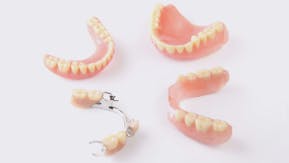How to Help Relieve Denture Pain and Discomfort
It’s normal to experience discomfort with dentures, especially when you first start wearing them.1 They may feel awkward or bulky as you get used to them.1 If your dentures put too much pressure on a certain area, it may become sore and painful.1 If this happens, it is strongly recommended that you contact your dentist immediately.
The good news is that you don’t have to suffer from sore gums in silence, and there are some simple things you can do that can help to relieve denture pain and irritation. Make sure you consult with your dental professional immediately to figure out relief that’s right for you.1
What Causes Sore Gums from Dentures?
Discomfort and pain from dentures are most often caused by an ill-fitting denture. Ill-fitting dentures can irritate the mouth, cause sore spots, and increase the risk of infections.1 While they may feel bulky or uncomfortable at first, they shouldn't be painful as you adjust.1 If they are, make sure to talk to your dentist about adjusting them.1
Even if you’ve been living with dentures for a while, they can become uncomfortable over time as your mouth structure naturally changes.1 The bone and gum ridges may get smaller or recede, making your normally comfortable denture painful.1 Getting your denture adjusted by your dentist should help fix this problem.1
Treating Partial Denture Discomfort and Sore Gums
Here are a few tips and home remedies to help alleviate sore gums, discomfort and sore spots from dentures.
Watch What You Eat
Following the directions from your dental professional, stick to soft foods while you get used to eating and drinking with new partials.1 There’s no need to puree all your food; just opt for soft, easy-to-chew foods such as pasta, scrambled eggs, yogurt and soup. Avoid acidic foods that could irritate any wounds in your gums.2
You should also chew on both sides of your mouth to keep even pressure on both sides to avoid stressing your partials.1 Avoid extremely sticky or hard foods, which could get stuck to your partials and potentially cause pain or discomfort.1
Clean Your Dentures Thoroughly
It’s important to keep your mouth and dentures clean to prevent further oral health problems.5 This is also why you should use a denture cleanser.5
Remove your dentures to brush them thoroughly at least once a day or as often as your dentist recommends.1 It is also essential for getting rid of food particles and plaque.5 Before brushing your partials, give them a quick rinse to remove any loose food particles.1 Then, use a non-abrasive cleanser to gently brush your partial dentures, using a separate soft-bristled toothbrush to avoid scratching their surface.1
Be thorough when brushing and flossing your natural teeth to maintain good oral health.6 Always follow directions and protocols from your dental professional.
Consult Your Dentist about Denture Pain
If your dentures are causing you pain or discomfort, reach out to your dental professional for advice as soon as possible. They can examine your teeth and gums and see what's causing the problem. If your dentures need an adjustment, dentists can help.1
Try a Salt Rinse
If you’ve just had a tooth extraction, try a salt rinse to promote gum healing at home.3 Remove your partials, add between ½ to 1 teaspoon of salt to a glass of warm water, and rinse your mouth for 15 to 30 seconds before spitting the solution out.2 Check with your dental professional before trying any home remedies.
Pain-Relief Medication for Denture Discomfort
If partial denture pain or discomfort persists, take an over-the-counter pain relief medication, such as acetaminophen or ibuprofen (which has anti-inflammatory properties).4 You might want to try Advil Dual Action, which combines acetaminophen and ibuprofen for up to 8 hours of powerful relief. Always consult with your dental professional for the most appropriate pain-relief medications before taking anything.
Remove Partials Overnight
Here’s another home remedy you can try to help relieve sore gums from dentures: take your partials out while you sleep.1 This gives your gums a chance to rest from the pressure of wearing partials all day.7 Leaving your partials to soak overnight in water and a Polident® denture cleanser will help remove tough stains.*1 Always follow your dental professional’s advice on removal and care of your partial.1
Try Denture Adhesives
Adhesives can help improve the comfort of your dentures.8 Denture adhesives can also prevent food from getting trapped under your dentures.8 When food gets trapped under your dentures, it can cause discomfort or pain.8 Try a denture adhesive like Poligrip Max Hold + Comfort. This adhesive provides a 12-hour hold for your full dentures.
Visit Your Dentist Regularly
If you have sore gums or partial denture pain, visit your dentist, who’ll be able to check the fit of your partials and correct any misalignment, as well as recommend other treatments to ease your pain or discomfort.1
*when used as directed
Source Citations:
- Removable Partial Dentures. MouthHealthy.org. https://www.mouthhealthy.org/en/az-topics/d/dentures-partial/. Accessed 1/12/2021.
- After Your Oral Surgery. Washington University School of Dentistry. https://dental.washington.edu/wp-content/media/oral-surgery/Afteryouroralsurgery.pdf. Accessed 23/03/20.
- What to do following an extraction. Oral Health Foundation. https://www.dentalhealth.org/what-to-do-following-an-extraction. Accessed 8/12/2024.
- Oral Analgesics for Acute Dental Pain. American Dental Association. https://www.ada.org/resources/ada-library/oral-health-topics/oral-analgesics-for-acute-dental-pain. Accessed 8/12/2024.
- Denture Care and Maintenance. American Dental Association. https://www.ada.org/resources/ada-library/oral-health-topics/dentures. Accessed 8/12/2024.
- Flossing. American Dental Association. https://www.mouthhealthy.org/all-topics-a-z/flossing. Accessed 8/13/2024.
- Dentures. Oral Health Foundation. https://www.dentalhealth.org/dentures. Accessed 8/13/2024.
- White paper on guidelines for the use of denture adhesives and their benefits for oral and general health. Oral Health Foundation. https://www.dentalhealth.org/Handlers/Download.ashx?IDMF=979d7385-8392-4f43-ba39-7c3171aa903b. Accessed 9/4/2024.






